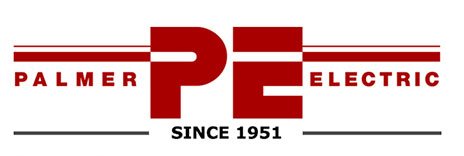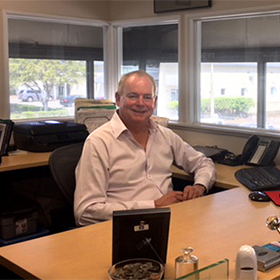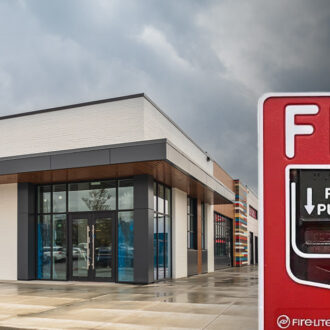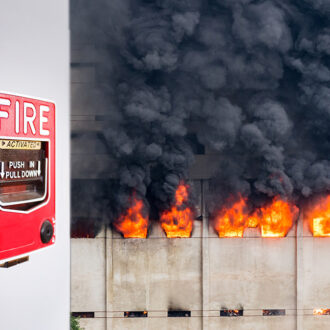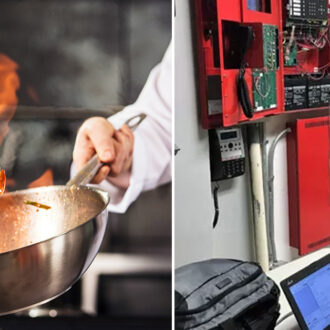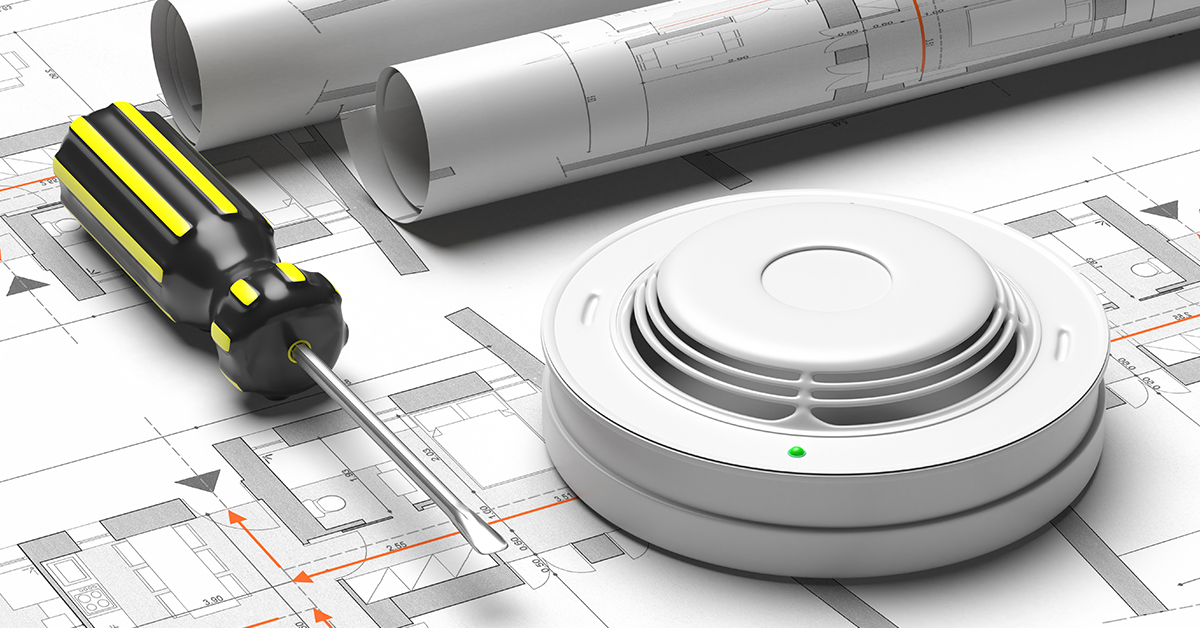
- Commercial Fire Alarm Systems
- Comprehensive Best Practices for Fire Alarm System Management
- Best Practices for Overall Fire Safety
- Smoke Detector Best Practices
- Maintenance Procedures for Fire Alarms
- Real-World Examples and Lessons
- How often should I replace my fire alarm system?
- Can I perform fire alarm maintenance myself?
- What should I do if my fire alarm system is malfunctioning?
- Business Fire Alarm System Company
In the heart of Orlando, where towering resorts meet historic neighborhoods, fire safety is paramount. At Palmer Electric, we’ve been safeguarding Central Florida’s buildings since 1951. From bustling theme parks to quaint Winter Park homes, every structure needs a well-managed fire alarm system. Drawing on our decades of experience in this unique region, we’ll share critical best practices for fire alarm management. Whether you’re a seasoned property manager or a new homeowner, these insights will help you protect what matters most in the Sunshine State
Commercial Fire Alarm Systems
Fire alarm systems are your first line of defense against fire-related disasters. They provide early warning, allowing for quick evacuation and potentially saving lives and property. In many cases, they’re also required by law and insurance policies.
Comprehensive Best Practices for Fire Alarm System Management
1. Regular Inspections and Testing
Conduct regular inspections and tests of your fire alarm system. The National Fire Protection Association (NFPA) recommends annual inspections for most systems, with some components requiring more frequent checks. In humid Central Florida, consider quarterly checks on smoke detectors to ensure they haven’t been affected by moisture or dust buildup.
2. Proper Documentation
Maintain detailed records of all inspections, tests, and maintenance performed on your fire alarm system. This documentation is not only required by many local fire codes but also helps you track the system’s performance over time and plan for future upgrades or replacements.
3. Staff Training and Education
Ensure that your staff knows how to respond when the fire alarm activates. This includes understanding evacuation procedures and knowing when and how to silence false alarms properly. Train multiple staff members on fire alarm procedures and response protocols to ensure coverage at all times.
4. Develop Clear Protocols
Communicate clear alarm response procedures to all employees. This should include steps for investigation, evacuation, and communication with authorities and monitoring companies.
5. Regular Cleaning and Maintenance
Schedule consistent maintenance to keep your system in optimal working condition. Regular cleaning helps ensure your system operates at peak efficiency, especially important in Orlando’s climate where pollen and humidity can be high.
6. Updating Your System
Stay up-to-date with the latest advancements in fire alarm technology. Many Orlando clients are now opting for wireless systems, which offer easier installation and maintenance.
7. Monitoring Service Integration
Consider integrating your fire alarm system with a professional monitoring service for round-the-clock protection.
8. Emergency Plan Development and Practice
Develop and practice a comprehensive emergency plan, including evacuation routes, assembly points, and communication protocols. Conduct fire drills at least twice a year to familiarize everyone with these procedures.
9. Communication with Authorities
Maintain open communication with local fire authorities. This relationship can be crucial in managing false alarms and implementing temporary measures like fire watch protocols when needed.
10. Judicious Use of Technology
While advanced features like smartphone apps can be helpful, always prioritize on-site confirmation of alarms.
Best Practices for Overall Fire Safety
While a well-maintained fire alarm system is crucial, it’s just one part of a comprehensive fire safety strategy. Here are some additional best practices to consider:
- Fire Extinguisher Placement and Maintenance: Ensure fire extinguishers are readily available and that your staff knows how to use them. In Florida’s hot climate, check extinguishers more frequently for signs of pressure loss.
- Clear Evacuation Routes: Keep all exit routes clear of obstacles, especially important in commercial buildings where inventory or equipment might block pathways.
- Electrical Safety: Regularly inspect all electrical systems to ensure they’re up to code, as many fires start due to electrical issues.
Smoke Detector Best Practices
Smoke detectors are a critical component of any fire alarm system. Here are some best practices specifically for smoke detectors:
- Proper Placement: Install smoke detectors on every level of your building, inside each bedroom, and outside sleeping areas. In larger commercial spaces, follow NFPA guidelines for detector spacing.
- Regular Testing: Test your smoke detectors monthly. It’s as simple as pressing the test button and listening for the alarm.
- Battery Replacement: For battery-operated detectors, replace the batteries at least once a year. We often recommend doing this when you change your clocks for daylight saving time as an easy reminder.
- Detector Replacement: Even hardwired smoke detectors don’t last forever. Replace your detectors every 10 years to ensure they’re working at peak efficiency.
Maintenance Procedures for Fire Alarms
Proper maintenance is key to ensuring your fire alarm system functions when you need it most. Here’s a basic maintenance schedule:
Weekly: Visually inspect the fire alarm control panel for any trouble signals.
Monthly: Test manual pull stations and a sampling of smoke detectors.
Quarterly: Test all supervised devices (like water flow switches in sprinkler systems).
Annually: Conduct a comprehensive inspection and test of the entire system, including all initiating devices, notification appliances, and any off-premises monitoring connections.
Remember, these are general guidelines. Your specific system may require additional or more frequent maintenance based on its age, type, and the environment it’s operating in.
Real-World Examples and Lessons
The Burnt Popcorn Incident:
At an Orlando marketing agency, burnt popcorn triggered the alarm. The fire safety officer evacuated the building, investigated thoroughly, and only then silenced the alarm. They contacted the monitoring company, logged the incident, and used it as a teaching moment for the team.
Key Lesson: Always follow proper investigation procedures before silencing an alarm, even for seemingly minor incidents.
The Faulty Sensor:
A Winter Park hotel experienced repeated false alarms due to a malfunctioning sensor. Unable to immediately replace it, they implemented a fire watch protocol in coordination with local fire authorities.
Key Lesson: Develop strong relationships with fire authorities and have contingency plans for equipment failures.
How often should I replace my fire alarm system?
Most fire alarm systems have a lifespan of 10-15 years. However, individual components may need replacement sooner.
Can I perform fire alarm maintenance myself?
While some basic tasks like testing smoke detectors can be done by property owners, most maintenance should be performed by certified professionals to ensure compliance with local codes and manufacturer specifications.
What should I do if my fire alarm system is malfunctioning?
If you suspect a malfunction, contact a professional immediately. Don’t try to disable the system, as this could leave your property unprotected.
Business Fire Alarm System Company
Proper fire alarm management is crucial for protecting lives and property. By implementing these best practices, you can ensure your fire alarm system is ready to perform when you need it most. Remember, when it comes to fire safety, it’s always better to be proactive than reactive.
Need expert help with your fire alarm system? Palmer Electric has been serving Orlando and Central Florida for over 70 years. Our team of professionals is ready to assist you with all your fire alarm needs. Call us today at 407-646-8700 to schedule a consultation or inspection. Don’t wait until it’s too late – ensure your property is protected with Palmer Electric!
